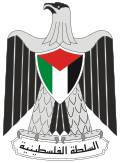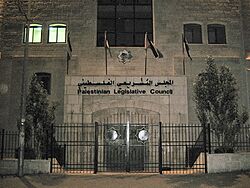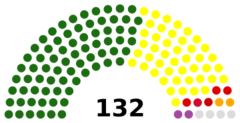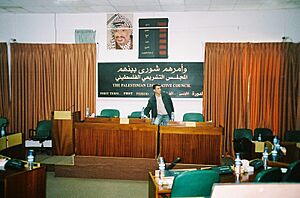Palestinian Legislative Council facts for kids
Quick facts for kids Palestinian Legislative Councilالمجلس التشريعي الفلسطيني Al-Majlis al-Tashrīʿiyy al-Filasṭīniyy |
|
|---|---|
| 2nd Legislative Council | |

The PLC emblem is referred to as the Eagle of Saladin
|
|

Entrance to the Palestinian Legislative Council in Ramallah
|
|
| Type | |
| Type | |
| History | |
| Founded | 1996 |
| Disbanded | 2007 |
| Leadership | |
|
Speaker
|
Aziz Dweik, Hamas
Since 29 March 2006 |
| Structure | |
| Seats | 132 |
 |
|
|
Political groups
|
Government (74)
Opposition (58)
|
| Elections | |
Parallel additional member system:
|
|
|
Last election
|
25 January 2006 |
|
Next election
|
TBD |
The Palestinian Legislative Council (PLC) is like a parliament for the Palestinian Authority. It is a group of lawmakers chosen by the Palestinian people living in the West Bank and Gaza Strip. The PLC has 132 members. These members are elected from 16 different areas.
Since 2007, the main meetings of the PLC have been paused. However, some of its smaller groups, called committees, still do important work. They continue to discuss issues and help with parliamentary tasks.
The PLC was first created in 1996. Its job is to make laws about everyday life and safety in certain parts of the West Bank and Gaza. In some areas, its powers are limited, and other authorities manage security.
The last election for the PLC was in 2006. After some disagreements between political groups in 2007, the PLC stopped holding regular sessions. New elections were planned for 2021 but were postponed.
Contents
What is the Palestinian Legislative Council?
The Palestinian Legislative Council was set up by agreements known as the Oslo Accords. These agreements explained how the PLC would be formed and what its responsibilities would be. The PLC's main role is to create laws for the Palestinian people.
For the PLC to make official decisions, at least two-thirds of its members must be present. This is called a "quorum." The laws made by the PLC cover things like civil matters and internal safety. However, these laws can be reviewed by other authorities.
The PLC is not allowed to negotiate directly with other countries. Its focus is on the internal affairs of the Palestinian territories.
A Look at Its History
The First Council: 1996-2006
The very first election for the Palestinian Legislative Council happened on January 20, 1996. In this election, one of the main political groups, Hamas, did not participate. As a result, another group called Fatah won most of the 88 seats.
The first PLC meeting took place on March 7, 1996. This council was meant to take over from a temporary government. However, the leader at the time, Yasser Arafat, did not fully transfer his powers to the PLC. Later, Ahmed Qurei served as the Prime Minister from 2003 to 2006.
The Second Council: 2006-Present
In 2005, the number of PLC members was increased from 88 to 132. A new way of electing members was also introduced. Half of the members were chosen based on the total votes for their party. The other half were chosen from specific local areas.
The second Palestinian legislative election was held on January 25, 2006. This election resulted in a significant victory for Hamas. The new PLC members officially started their work on February 18, 2006. A new government led by Hamas was then formed in March 2006.
After some political disagreements in June 2007, the PLC stopped holding its main meetings. Since then, new laws have been made by presidential decisions. Elections for a third PLC were planned for May 2021 but were put on hold.
Challenges Faced by the Council
The Palestinian Legislative Council has faced several difficulties that have made it hard for it to work smoothly.
- Travel Difficulties: Members of the PLC have sometimes found it hard to travel freely. They needed special permits for their journeys, which were sometimes hard to get. This made it difficult for them to attend meetings.
- Political Activities: Some politicians faced challenges in their political work. This included members being held for long periods without formal charges. This affected the makeup of the PLC.
- Political Disagreements: After 2007, there were disagreements between the main political groups. This led to the Palestinian government being divided. Since then, the PLC has not been able to meet as a whole.
- Different Opinions: Palestinians have different views on past agreements. These differing opinions can sometimes weaken the PLC's position and its ability to make decisions.
PLC vs. PNC: What's the Difference?
It's important to know that the Palestinian Legislative Council (PLC) is different from the Palestinian National Council (PNC).
The PLC represents only the Palestinian people who live in the West Bank and Gaza Strip. It is the parliament for the Palestinian Authority, which governs these territories.
On the other hand, the PNC is the parliament for the Palestine Liberation Organization (PLO). The PLO is recognized by the United Nations as the government of the State of Palestine. The PNC represents all Palestinian people, including those living outside the Palestinian territories.
The PLO has an Executive Committee that acts as the official government of the State of Palestine. While the PLO itself doesn't have candidates for the PLC, its member political groups can participate in PLC elections. Today, the PLO Central Council often handles the duties of both the PLC and PNC, as both councils have faced challenges in meeting regularly.
Where the Council Meets
The Palestinian Legislative Council has different buildings for its work. In the West Bank, it has offices in Ramallah and al-Bireh. The main administrative office is in al-Bireh.
In Gaza City, the PLC's headquarters is located in an area called Rimal. There was also a plan to build a new parliament building in Abu Dis, near East Jerusalem. However, this project was never completed.
Sadly, the PLC buildings have sometimes been damaged. For example, in 2002, the West Bank headquarters was heavily damaged. In 2009, the Gaza headquarters was also damaged.
See also
 In Spanish: Consejo Legislativo Palestino para niños
In Spanish: Consejo Legislativo Palestino para niños
- Current members of Palestinian Legislative Council
- Palestinian Legislative Council (Gaza Strip)
 | Jessica Watkins |
 | Robert Henry Lawrence Jr. |
 | Mae Jemison |
 | Sian Proctor |
 | Guion Bluford |


